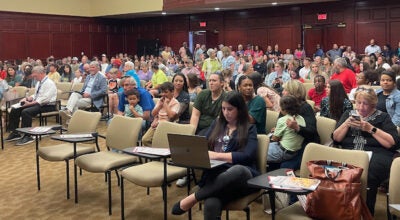Agent Orange topic of discussion at town hall meeting
Published 8:40 am Sunday, October 20, 2013
During the Vietnam War, the U.S. military used lethal mixtures of chemical defoliants to remove forest cover for Viet Cong and North Vietnamese soldiers.
Planes flew over southern Vietnam and the borders of neighboring Laos and Cambodia dumping deadly herbicides. Out of all of the mixtures, Agent Orange, which contained the chemical dioxin, was the most commonly used and the most effective.
Nearly 20 million gallons fell over 4.5 million acres in Vietnam from 1961 to 1972 on and around American soldiers. They could see it falling from the sky, through the trees, to the ground where they were fighting. They would breathe it in day and night, unaware of the consequences.
Today, former service members are suffering from their time around those herbicide-soaked jungles.
Now that Vietnam veterans are becoming senior citizens, they’re increasingly susceptible to health problems. Many are still fighting for medical compensation.
From heart disease to Type 2 diabetes and beyond, these former servicemen are suffering the effects of Agent Orange. To complicate matters, links have been made to the illnesses of their offspring all the way to the third and fourth generations. Saturday’s town hall meeting at W.B. Williamson American Legion Post 1 in Lake Charles addressed Agent Orange and what it continues to do to the Vietnam War generation.
Herb Worthington, chairman of the Agent Orange and Other Toxic Exposures national committee for Vietnam Veterans of America, led the meeting. He was joined by a representative from the state Department of Veterans Affairs, as well as several retired military and veterans affairs advocates. Worthington talked about the effect Agent Orange has had on his family.
“My daughter has MS; my son has allergies and asthma,” Worthington said. “His kids have the same problems, along with anger issues. This Agent Orange stuff has been around a long time. We know it has reached four generations.”
During the meeting, the idea that the VA needed to expand its list of presumptive diseases associated with Agent Orange and dioxin was discussed at length. Light was also shed on the connections between dioxin and learning-disabled children. Worthington emphasized the idea that veterans shouldn’t believe they should go about their journeys alone. They should reach out to local representatives for assistance when dealing with the VA.
As the meeting progressed, audience members were given the chance to speak openly about their situations. Some described struggling with paperwork to receive benefits for problems they felt were from exposure to Agent Orange. Others were just looking for a chance to share their stories with fellow soldiers.
Everett Bellfield spoke during the open-floor portion of the meeting. He talked about his health, the health of his children and new problems he has been having as of late. He also thanked the panel for what they were doing with events like the town hall meeting. During a break, Bellfield described his situation in further detail.
“I’m a Marine. I was in Vietnam. When they told me I had to go to war, I went. I was in the bush fighting,” Bellfield said. “I did what was asked of me. I didn’t want to go. And I came home as a decorated service member, but they don’t want to recognize my ailments.”
Bellfield’s story was similar to those of many of the veterans in attendance. Bellfield said much of his combat experience dealt with special operations as a member of the Marines. He said he spent time in Cambodia, one of the locations where Agent Orange use was prevalent. He added that since the operations were secretive, the experience isn’t listed in his military records. This has become a problem as he continues to work to get treatment for a growing list of ailments.
“I have cancer, high blood pressure and heart disease. I’m on dialysis because of my kidneys now, too,” Bellfield said.
As a father of two daughters, Bellfield said many of his concerns now have to deal with their health. Studies have come to show the mixtures have caused serious health issues, including tumors, birth defects, psychological symptoms and cancer in the families of U.S. servicemen.
“I have two daughters. They’ve both had eye surgery. One was born with a heart valve that was too small,” Bellfield said. “I’m not looking for a handout or anything. I did what I was asked to do.”
Pamphlets were stacked on nearby tables listing resources for the veterans. From the VVA to the Veterans Health Council, websites and contact numbers were provided to help the servicemen find some of the answers they were searching for.
(mgnonline.com)





